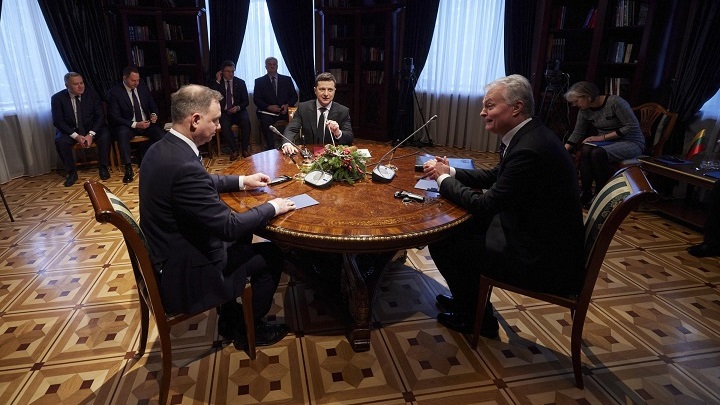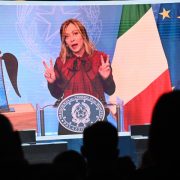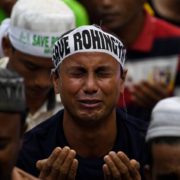
Nel paese di Machiavelli, culla e incubatrice forse di metà dei macchiavellismi globali, il caso non esiste. È tutto un complotto, una cospirazione, una trama che si dipana e avvolge il mondo in un clima di sospetti e retropensieri. Lo è così tanto che dall’estero tali fili sembrano acrobazie mentali, non credibili e quindi non vere, come i gesti del giocoliere che annuncia di tenere in moto cinque piatti sui bastoni. Non pare vero, ma davvero non è vero?
Le coincidenze però, se non pensate ad arte, sono comunque segni del destino. Quindi ecco i fatti.
Il 10 gennaio inizieranno i colloqui tra Usa e Russia sull’Ucraina e i rispettivi arsenali nucleari. Un incontro tra Russia e Nato potrebbe poi aver luogo il 12 gennaio, seguito il 13 gennaio da un incontro tra la Russia e l’Organizzazione per la sicurezza e la cooperazione in Europa (Osce), di cui fanno parte gli Stati Uniti.
La questione dell’Ucraina è centrale per l’equilibrio dell’Europa. La Russia vuole che l’Ucraina rimanga una specie di stato cuscinetto tra sé e la NATO. Ma la definizione di cuscinetto è ambigua, e l’Ucraina e altri paesi ex sovietici non si fidano. In mezzo a una guerra a bassa intensità nella regione del Donbass, Kiev chiede la protezione della NATO.
Così desiderano anche Polonia e paesi Baltici, diffidenti delle mire di Mosca. Essi, a torto o a ragione, pensano che la Russia stia tentando di allungarsi sull’Ucraina come ha fatto sulla Georgia, sul Caucaso, in Siria o Libia. Temono che paesi est europei come l’Ungheria potrebbero essere spinti a maggiori ambiguità filo russe se l’Ucraina si piegasse verso Mosca.
D’altro canto la Russia, teme, a torto o a ragione, l’accerchiamento NATO, e le mire politiche “imperiali” fanno parte del DNA culturale della Russia, rinunciarvi a est verso la Cina o a ovest verso la UE, sarebbe come cambiare questo DNA, una cosa molto complicata.
Inoltre la concentrazione crescente degli USA sul fronte cinese e asiatico creano oggettivamente un’opportunità di manovra per i Russi in Europa e nel Mediterraneo. Perché il presidente russo Vladimir Putin non dovrebbe approfittarne per, dal suo punto di vista, riprendersi almeno in parte ciò che è suo?
In questa complicata partita in cui il Mar Mero ha un ruolo speciale, in mezzo tra il Mediterraneo e il Caspio, c’è una coincidenza.
I giorni in cui USA e Russia cominciano a parlarsi sull’Ucraina, e quindi sulla geografia politica dell’Europa e del Mediterraneo, si avvia anche la intricata scommessa dell’elezione del presidente della Repubblica italiana.
L’Italia ha un rapporto antico e speciale con la Russia. Mosca nasce come terza Roma, i Savoia, alleati degli Inglesi, depongono i Borbone di Napoli, alleati alla Russia. L’unità d’Italia nasce con l’espulsione della influenza russa dalla penisola. Tale influenza però è dura a morire. Nel dopoguerra l’Italia è patria del più grande partito comunista, filo sovietico, dell’occidente. Né Mosca smette di essere presente in Italia con la fine della guerra fredda.
I giornali hanno parlato per anni delle relazioni politiche e di affari tra il leader di Forza Italia Silvio Berlusconi. Il leader della Lega Matteo Salvini è arrivato agli onori delle cronache per suoi rapporti, forse ambigui, con enti moscoviti. Naturalmente tutto può essere legittimo. La politica estera si incatena e incarna nelle politiche interne. Quindi se l’Unione Europea e l’America tifano per il dissidente russo Alexei Navalny contro Putin, perché Putin non dovrebbe magari tifare per il suo amico Berlusconi presidente della repubblica italiana?
Quindi il dubbio è: il grande giocoliere Putin parlerà, direttamente o indirettamente, di Italia nei colloqui con gli USA? O viceversa, quanto la possibilità non remotissima, di un Berlusconi presidente della Repubblica italiana, graverà nei pensieri americani attenti a cercare di rabberciare la complessa mappa politica europea?
Forse sono domande peregrine, ma l’Italia è stata già campo di battaglia della prima guerra fredda. Inoltre gesti forse scriteriati dei predecessori del governo Draghi, ingenuità e facilonerie persistenti della politica estera italiana in generale e con la Cina, hanno già messo Roma in mezzo alla seconda guerra fredda. Ciò è ufficialmente in gran parte ignorato nel dibattito pubblico e scivolate ulteriori sulle scelte del Quirinale, forse potrebbero avere effetti devastanti, per un paese membro della NATO e della UE.
Certamente l’Italia non è in condizioni di fare una guerra a chi che sia, ma almeno dovrebbe evitare di diventare di nuovo campo di battaglia. Forse questa l’attenzione di massima che si dovrebbe avere nella corsa al Quirinale.
An Italian Ukrainian Gambit
In the country of Machiavelli, cradle and incubator of perhaps half the world’s Machiavellianisms, chance does not exist. Everything is a plot, a conspiracy, an intrigue that unravels and envelops the globe in an air of suspicion and second thoughts. It is so much so that from abroad such threads seem like mental acrobatics—not credible and therefore not true—like the moves of the juggler who announces he will be spinning five plates on five sticks. It does not sound true, but is it truly untrue?
Coincidences, however, if not artfully thought out, are still signs of destiny. So here are the facts.
On January 10, talks will begin between the US and Russia on Ukraine and their respective nuclear arsenals. A meeting between Russia and NATO could then take place on January 12, followed on January 13 by a meeting between Russia and the Organization for Security and Cooperation in Europe (OSCE), of which the US is a member.
The issue of Ukraine is central to the balance of Europe. Russia wants Ukraine to remain a kind of buffer state between itself and NATO. But the definition of a buffer is ambiguous, and Ukraine and other former Soviet countries do not trust it. In the midst of a low-intensity war in the Donbass region, Kiev seeks NATO protection.
So do Poland and the Baltic countries, wary of Moscow’s aims. They, rightly or wrongly, think that Russia is trying to stretch itself over Ukraine as it did over Georgia and the Caucasus or in Syria and Libya. They fear that Eastern European countries such as Hungary could be pushed into more pro-Russian ambiguity if Ukraine bends toward Moscow.
On the other hand, Russia, rightly or wrongly, fears NATO encirclement. “Imperial” political aims are part of Russia’s cultural DNA, and to give them up in the east or west would be like changing this DNA: a very complicated thing.
Moreover, the increasing US concentration on the Chinese and Asian fronts objectively creates an opportunity for the Russians to maneuver in Europe and the Mediterranean. Why should Russian President Vladimir Putin not take advantage of this to, from his point of view, seize back at least part of what is his?
In this byzantine game, in which the Black Sea plays a special role between the Mediterranean and the Caspian, there is a coincidence.
In the days when the US and Russia are beginning to talk to each other about Ukraine, and therefore about the political geography of Europe and the Mediterranean, the intricate contest of electing the president of the Italian Republic is also beginning.
Italy has an ancient and special relationship with Russia. Moscow was born as the third Rome. The Savoy, allied to the British, deposed the Bourbons of Naples, allied to Russia in 1860. The 1861 unification of Italy came about with the expulsion of Russian influence from the peninsula. This influence, however, died hard. After the World War II, Italy was home to the largest pro-Soviet communist party in the West. Nor did Moscow cease to be present in Italy with the end of the Cold War.
Newspapers have talked for years about the political and business relations of Forza Italia leader Silvio Berlusconi. League leader Matteo Salvini made the headlines for his possibly ambiguous relations with Moscow entities. Of course, everything may be legitimate. Foreign policy is chained and embodied in domestic policies. So, if the European Union and America are rooting for the Russian dissident Alexei Navalny against Putin, why shouldn’t Putin root for his friend Berlusconi to be president of the Italian Republic, housed in the Quirinal Palace?
Then, the question is: Will the great juggler Putin mention, directly or indirectly, Italy in talks with the US? Or vice versa, how much will the not-so-distant possibility of Berlusconi as president of the Italian Republic weigh on American minds as they try to mend the patchy European political map?
Perhaps these are peregrine questions, but Italy has already been the battlefield of the first cold war. Moreover, perhaps ill-considered gestures by predecessors of the Mario Draghi government, and the persistent naivety and excessive ease of Italian foreign policy in general and with China, have already put Rome in the middle of the second cold war. This is largely ignored in the Italian public debate and further slippage on the Quirinal’s choices could perhaps have devastating effects for a NATO and EU member country.
Certainly, Italy is not in a position to wage war on whomever, but at least it should avoid becoming a battlefield again. Perhaps this is the maximum attention one should have in the race for the Quirinal.





